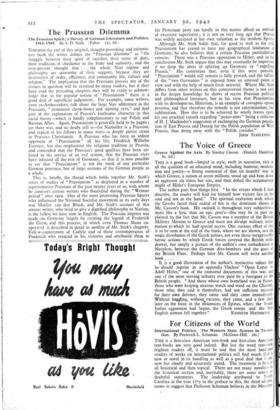The Prussian Dilemma
The Prussian Spirit; a Survey of German Literature and Politics, 1914-1940. By S. D. Stirk. (Faber. 525. 6c1.)
TOWARDS the end of this original, thought-provoking and informa- tive book the writer defines the " Prussian dilemma " as " the struggle between their spirit of sacrifice, their sense of duty, their traditions of obedience to the State and authority, and the ever-present thought that . . . the whole Nazi regime and philosophy are unworthy of their support, because they are destructive of order, efficiency, real community life, culture and religion." The implication that the Prussians possess any of the virtues in question will be resented by many readers, but if they have read the preceding chapters they will be ready to acknow- ledge that in the popular notion of " Prussianism " there is a good deal of superficial judgement. For example,, some writers, even ex-Ambassadors, talk about the large Slav admixture in the Prussians, " prominent cheek-bones and slanting eyes," and find part of the explanation of Prussia's loathsome character in this racial theory—which is hardly complimentary to our Polish and Russian Allies. Again, Prussianism is generally held to be pagan ; yet there was, and no doubt still is—for Niernoller is a Prussian, and typical of his fellows in many ways—a deeply pietist strain in Prussian Christianity. A Prussian who has been an ardent opponent of " Prussianism " all his life, Friedrich Wilhelm Foerster, has also emphasised the religious tradition in Prussia, and contended that the Prussian's good qualities have been en- listed in the service of an evil system, that the Prussian vices have infected all the rest of Germany, so that it is now possible to say that " Prussianism " is not the mark of any particular German province, but of large sections of the German people as a whole.
This is, briefly, the thread which holds together Mr. Stirk's series of studies of " Prussianism " as displayed in a number of representative Prussians of the past twenty years or so, with whom he contrasts certain writers who flourished during the " Weimar period " after 1919. One of the most interesting Prussian figures who influenced the National Socialist movement in its early days was Moeller van den Bruck, and Mr. Stirk's account of this serious writer, who tried to give a dignified philosophy to Nazism, is the fullest we have seen in English. The Prussian impress was made on Germany largely by creating the legend of Frederick the Great, and this process, in which even Thomas Mann co- operated is described in detail in another of Mr. Stirk's chapters. Fellcw-countrymen of Carlyle and of those contemporaries of Frederick who rejoiced in his victories and attributed them to his Protestant piety can hardly in this matter afford an attitude of excessive superiority ; it is not so very long ago that Prussia was widely accepted at her own valuation as the modern Sparta.
Although Mr. Stirk holds that, for good as well as for evil, Prussianism has ceased to have any geographical limitation in Germany, he also believes that a certain Prussian particularism remains. There was a Prussian opposition to Hitler, and in his conclusions Mr. Stirk argues that this may eventually be important if we drop the ideas of splitting up Germany or " expelling Prussia." His contention that, even if this were potsible, "Prussianism " would still remain is fully proved, and the fallacy of the " two Germanies " is exposed from an unusual point of view and with the help of much fresh material. Where Mr. Stirk differs from other writers on this controversial theme is not only in the deeper knowledge he shows of recent Prussian political and philosophical literature, but in his view that Prussianism, with its development, Hitlerism, is an example of corruptio optimi pessima, and that therefore the remedy is not extermination, but sublimation. How this is to be achieved he wisely leaves open, his one practical remark regarding " peace-aims " being a criticism of H. J. Mackinder's suggestion of exchanging the German popula- tion of East Prussia and Danzig for the Polish population of West Prussia, thus doing away with the " Polish corridor."
JOHN STAPLETON.


























 Previous page
Previous page